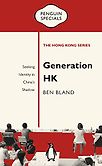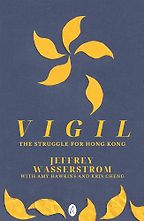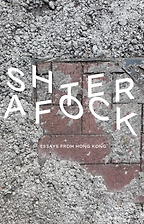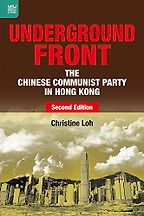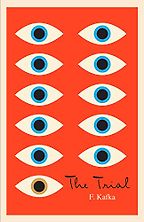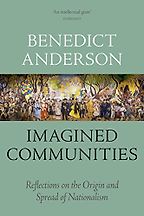Before we get to the books you’re recommending on Hong Kong’s protests, a question. The city is once again making headlines with the reactions to China’s repressive new security law: what is your take on the law and its effects – is this the death knell for Hong Kong, or will the democracy movement survive?
The National Security Law deals a heavy blow to Hong Kong’s freedoms and signifies the end of any meaningful autonomy for Hong Kong. The Chinese Communist Party has been tightening its grip on the city over the last decade. That process accelerated dramatically in response to last year’s unprecedented rolling protests. Some young activists have already been rounded up under the new law, while others, like Nathan Law, have already fled Hong Kong, possibly for good.
But I believe the democracy movement will fight on, even as Beijing escalates its repression. In fact, the more Beijing has squeezed the city in recent years, the more it has hardened the opposition. As the costs of defiance rise, and the avenues for dissent are cut off, activists will have to find different ways to fight back. Hong Kongers have shown remarkable resilience and inventiveness and they will need to tap these reserves to keep the resistance alive.
Your book on Hong Kong’s young generation of democracy activists, Generation HK: Seeking Identity in China’s Shadow, came out at the end of 2017. Now many of those activists you profile, such as Nathan Law and Joshua Wong, are getting out of the city or leaving their organisations, out of fear of the new law. Does this mean their efforts have failed?
You could say that the definition of activism is working toward seemingly impossible goals. Otherwise we would just call it politics. In the short term, these activists have evidently failed to bring democracy to Hong Kong. But most people in the movement understood that Beijing was highly unlikely to grant genuine democracy to the city or to suddenly start respecting Hong Kongers’ rights and unique identity. Their aim was to awaken the wider Hong Kong public to the perils they are facing, to bring their struggle to the attention of the outside world and to fuel the desire to build a better Hong Kong. They have been remarkably successful in this. Through their energy, idealism and sense of sacrifice, young activists have helped bind together a wide-ranging democracy movement in a city that was previously known for its political apathy.
What do you expect the next generation of Hong Kongers to be like, the ones who grow up in this new era? Will they be as passionate about their separate identity as the current youth are, or do you expect the character of the city to change?
Political movements – like cities – are never static. As I argue in my new book on Indonesia, people are not paralysed by their history. They can change its future course, but they are conditioned and constrained by what has gone before. Beijing was hoping that it could effectively write off the generation of activists behind the Occupy protests of 2014 and indoctrinate the next cohort of young Hong Kongers to be true Chinese patriots. But it has become clear over the last year that today’s school kids are as determined to defend their rights and their identity as the generation of Nathan Law.
“People are not paralysed by their history. They can change its future course. But they are conditioned and constrained by what has gone before”
The battle for Hong Kong’s rights – and the soul of the city itself – is likely to intensify as Beijing doubles down on its repressive tactics. But the Chinese Communist Party has no realistic strategy to win hearts and minds in Hong Kong. Mainland-style patriotic education and ideological rectification campaigns will not work in a city where young people are used to questioning and thinking for themselves. Sense of identity is central to who we are as human beings. When it is threatened, it prompts a visceral reaction. A bigger risk is that the crackdown prompts an exodus from Hong Kong. But I think many Hong Kongers are loath to leave the city.
Let’s turn to the first book you’ve chosen about the Hong Kong protests. This is Vigil: Hong Kong on the Brink by Jeffrey Wasserstrom.
Vigil is a great, snappy introduction to how Hong Kong got where it is today. Whereas many Sinologists focus on the exceptional qualities of Xi Jinping’s China, Wasserstrom, a historian, looks at Hong Kong’s troubles through a comparative lens. He reaches back into China’s past, as well as looking around the world, to help the reader make sense of events in Hong Kong. Rather than offering a chronological account of the protests and crackdowns, he offers a series of thematic snapshots of key moments and their impact, from the successful attempt to oppose national security legislation in 2003 to the abduction by Chinese agents of the Causeway Bay booksellers in 2015.
The problem for anyone writing about Hong Kong these days is that events are moving so fast. Much has changed since the book was written last year. But Vigil is still a useful guide to the broader forces pulling Hong Kong apart. Wasserstrom highlights several intriguing paradoxes. Although many activists look to Hong Kong’s mini-constitution, the Basic Law, to defend their rights, the document is deeply contradictory as it also enshrines Beijing’s right to exert total control over Hong Kong’s system. Beijing’s pledges about human rights were meant to secure a compromise deal with the British and dissuade Hong Kongers from fleeing en masse after the handover in 1997. Beijing never intended to uphold them. But it inadvertently stoked hopes for democracy, like a parent who, as Wasserstrom puts it, “drives a child crazy by promising candy that he never delivers”.
While it is surprising how hard Beijing has cracked down on Hong Kong in the last few years, it is also surprising that the Communist Party left the city alone for so long. As the last colonial governor, Chris Patten, told Wasserstrom: “When the snow starts melting, it melts quickly.”
Book number two on your list of books about the Hong Kong protests is Aftershock: Essays from Hong Kong, edited by Holmes Chan.
Much of the recent English-language writing on Hong Kong has come from foreign journalists, authors and academics, including myself. That’s what makes Aftershock so refreshing. It’s a short collection of essays from young Hong Kong journalists who were on the frontlines of the recent protests and it is a bracing introduction to how it feels to have your home pulled apart in front of your eyes. Outside observers pride themselves on their cool analysis. By very deliberate contrast, this is writing that lives, breathes, cries, screams and bleeds. For these writers, Hong Kong is not a story or a portent of the coming Cold War between China and the West. It is their home, their family, their fight, their future.
Holmes Chan, the editor, says that these reporters are united by their “choice to care: not just as a matter of professional interest, but in a way that opens themselves up to the risk of loss and heartbreak”. In focusing on feelings rather than facts, Aftershock reveals how a strong sense of shared identity has been forged in the flames of political conflict. Frances Sit says that while the protests are ostensibly about freedom and democracy, they are “also about protecting strangers who have come to recognise each other as brothers and sisters”. But one Hong Konger’s unity is another’s division, as Sit admits when she falls out with her aunt after she endorses the police beating up “cockroaches”, as they called protesters.
“The more Beijing has squeezed the city in recent years, the more it has hardened the opposition”
This is not a book about movements but people. Elaine Yu is taken aback by the youth of many activists. There are the kids holding hands outside their school with placards quoting a Song dynasty poet who said “I’d rather die than live in silence”. Then there are the Molotov-throwing front-liners, who embraced unprecedented levels of violence as they clashed with the police time and again. She writes: “from afar, it was easy to call them a black bloc; but up close, they were teens barely old enough to be sent to prison”.
Like their counterparts covering the Black Lives Matter movement in the US, some of these reporters feel a tension between their editors’ desire for objective journalism and their own political sympathies. Jessie Pang describes it as a “tug of war between the search for truth and personal feelings”. While reporting on the “siege of Polytechnic University”, when students barricaded themselves inside the campus and police surrounded them, Pang relates how one activist asked her for a pen before surrendering to the authorities. Fearing that the police might attack him in custody (or worse), he wanted to write a note declaring that he had no injuries and would not commit suicide. It is a dark read in many places. But Pang argues that “there will be light in the darkest hours”. She concludes: “Both as a Hong Konger and a journalist, I want to report until the end. This is the only thing I know and can do for Hong Kong.”
Let’s move on to the next book and what light it sheds on the Hong Kong protests. This is Underground Front: The Chinese Communist Party in Hong Kong by Christine Loh.
As the Chinese Communist Party takes ever more control over Hong Kong, Christine Loh’s history of the CCP in Hong Kong is essential reading. Long before it was fashionable to talk about the CCP’s United Front work, Loh was meticulously documenting how the Party made friends and influenced people in Hong Kong. Before the Second World War, the CCP saw British-controlled Hong Kong as a base to gather support, obtain funding and spread its ideas throughout China. Later, as the handover from British control came into sight, it switched focus to obtaining control over key groups in society and smoothing the transfer of power.
Loh, a former legislator and senior government official, explains that the CCP never intended the ‘one country, two systems’ arrangement to provide a path to true democracy and autonomy for Hong Kong. Rather, like other United Front activities, it was a means to an end: full CCP control over the city and the unity of China. The Party was remarkably successful before the handover in winning the support of the city’s influential tycoons by promising to leave their businesses well alone. But Loh argues that this led to over-confidence and an over-reliance on Hong Kong businesspeople and officials who were seen by many people as United Front mouthpieces. This “inhibiting and debilitating legacy” is one of the major reasons for the widespread loss of trust in the Hong Kong authorities over the last few years.
Get the weekly Five Books newsletter
Loh also describes how the city has always been a source of idealistic young radicals. In the mid-1920s, students from Hong Kong’s elite Queen’s College went on strike and travelled to mainland China to support the nascent CCP in its early revolutionary activities. Nearly a century later, during last year’s protests, pupils from Queen’s College staged another class boycott, this time in opposition to the CCP as they chanted “Liberate Hong Kong, Revolution of Our Times”, a protest slogan the authorities recently outlawed because it “incites secession”.
What makes Loh’s work so interesting is that while she casts a critical eye on the CCP’s historical record in Hong Kong, she is far from the usual CCP critic. In fact, she has argued elsewhere that Hong Kongers need to embrace the People’s Republic of China, abandon their hopes for Western-style liberal democracy, and work for the betterment of the nation. It is not a view that many young Hong Kongers will share. But they will learn much from her writing about the CCP.
Your fourth pick is an unusual book to choose for Hong Kong protests, but sheds an interesting light on current affairs through the prism of absurdism: The Trial by Franz Kafka.
The concept of law is more central to life in Hong Kong than any other place I’ve worked in the world. In most democracies, the law tends to play out in the background, barely noticed or commented upon but somehow comforting, like muzak in a lift. In Hong Kong it’s in your face, from the Basic Law to the quasi-religious faith in independent judges and the rule of law. There is no better book than Franz Kafka’s The Trial to smash our illusions about the law into a thousand desolate pieces. For that reason, I probably shouldn’t recommend it. It’s a bit like advising someone to read Albert Camus’s The Plague right now. It’s not exactly solace-inducing. But it’s powerful and apt for Hong Kong today.
The Trial opens with a sentence that is stark but beautiful in its minimalism: “Somebody must have laid false information against Josef K., for he was arrested one morning without having done anything wrong.” From there, Kafka traces Josef K.’s downfall as he is sucked into a faceless, merciless bureaucratic machine that is determined to destroy him. Kafka foresaw the devastating ways in which totalitarian states would turn the law into a tool for repression. That is what is happening in contemporary Hong Kong. The civil service and the law have been weaponized to enforce Beijing’s will in the city.
“Through their energy, idealism and sense of sacrifice, young activists have helped bind together a wide-ranging democracy movement in a city that was previously known for its political apathy”
One parable contained within The Trial relates how a man approaches “The Law” but meets a lowly gate-keeper who tells him he can’t get access to the law now. The man waits there patiently until his dying breath and, as he fades away, he asks why no one else passes through the gate. The guard replies that “this entrance was meant only for you” and proceeds to close it. It makes me think of the Basic Law and the hope many Hong Kongers placed in its supposed guarantees of democracy and human rights. I don’t think Beijing’s gatekeepers ever intended to let the people of Hong Kong gain access to these parts of the Basic Law.
Your fifth book on Hong Kong and its protests also steps back to look at the wider context of what Hong Kong identity means in the first place, via Benedict Anderson’s Imagined Communities.
When I was researching Generation HK back in 2015 and 2016, the received wisdom was that young Hong Kongers were upset because of politics – as in the lack of human rights and democracy – or economics, as in the high cost of living and low salaries. These were both important factors driving the Occupy Movement and the wider political awakening that culminated in last year’s mass protests. But I felt that people were overlooking the role of identity, which has acted as both a social glue and a political accelerant in Hong Kong. Hong Kongers aren’t just fighting for abstract concepts but for their homeland and for their fellow Hong Kongers.
As a former student of Southeast Asian politics, my thinking was heavily influenced by Benedict Anderson’s seminal study of nationalism. Defining a nation as an “imagined political community”, he argues that it was the “deep, horizontal comradeship” of nationalism that “makes it possible, over the past two centuries, for so many millions of people, not so much to kill, as willingly to die for such limited imaginings”. I remembered these words last year when I heard of teenagers in Hong Kong going out to fight the police with sticks and shields in their hands and their last will and testament in their pocket.
“You could say that the definition of activism is working toward seemingly impossible goals”
There are many other uncanny parallels in Imagined Communities. Anderson singled out tombs of the Unknown Solider as emblematic of the modern culture of nationalism. During last year’s protests, Hong Kongers set up shrines to unknown activists who were believed to have died at the hands of the city’s unhinged police force. Whether Beijing likes it or not, Hong Kongers are imagining themselves as a distinct community of people that cuts through space and time, life and death.
Hong Kong’s struggle mirrors the anti-colonial movements of Southeast Asia in the first half of the twentieth century, which Anderson documents so well. Just like Western imperial powers then, Beijing today believes that its repression will eradicate opposition by a “minority of troublemakers”. But it is instead having the opposite effect. When a handful of Hong Kongers started booing the Chinese national anthem at football matches, Beijing made it illegal to do so. Then Hong Kongers wrote their own protest anthem, which has been sung by millions in the city and around the world. Now the authorities are creating a new generation of (mostly young) political prisoners and exiles and in doing so they risk creating new nodes of opposition and new stories of resistance. In the flames of conflict, an ever stronger Hong Kong identity is being forged – a nation without a state.
As a final coda, your new book, Man of Contradictions, tells the story of Joko Widodo and his hopes to build a new Indonesia. Why should we be following what’s happening to Indonesia, and does it relate to Hong Kong and other Asian politics at all?
Indonesia has been called “the world’s biggest invisible object” because there is probably no other country that is so large and so important yet so little understood in the outside world. How many foreigners could even find it on a map? As the world’s fourth most populous nation, a G20 economy, and a vibrant if flawed democracy, Indonesia will play a key role in determining how the balance of power in Asia is settled between an assertive China and a wounded US. More than that, Indonesia is a fascinating, beautiful country and its leader, Joko Widodo, is a compelling character who rose to the presidency from humble origins and has transformed himself into a powerful insider.
Jokowi, as he is known, reflects the contradictions of modern Indonesia, caught between democracy and authoritarianism, Islam and pluralism, openness and protectionism. Like Hong Kong and many other Southeast Asian nations, Jokowi’s Indonesia is still trying to find its way forward from a troubled legacy of colonialism and dictatorial rule. At the same time, it is also struggling to work out how to live in China’s shadow, although geographical distance and national sovereignty mean that Indonesia’s challenge is far easier than the challenges facing Hong Kong.
One last softball question before I let you go. In all of the discussions of Hong Kong politics, we sometimes forget what makes the city so special on a street level. You lived there for four years and have visited many times: what was your favourite aspect of life in Hong Kong?
My favourite place in Hong Kong is the little-visited Mai Po wetlands in the far northwest of the city. It’s a beautiful nature reserve and as far away as you can get from bustling, hustling, urban Hong Kong. The mangroves are well protected and get some impressive birds stopping over on their long migratory routes. The flip-side of Hong Kong’s crazy urban density is that the authorities have carved out spaces like this to provide some respite and tranquillity. But, fittingly, mainland China still looms large over Mai Po. While the skyscrapers of Shenzhen tower above, the kingfishers, herons and spoonbills forage in the muddy waters below.
Interview by Alec Ash
September 2, 2020. Updated: September 26, 2024
Five Books aims to keep its book recommendations and interviews up to date. If you are the interviewee and would like to update your choice of books (or even just what you say about them) please email us at [email protected]
Five Books interviews are expensive to produce. If you've enjoyed this interview, please support us by donating a small amount.

